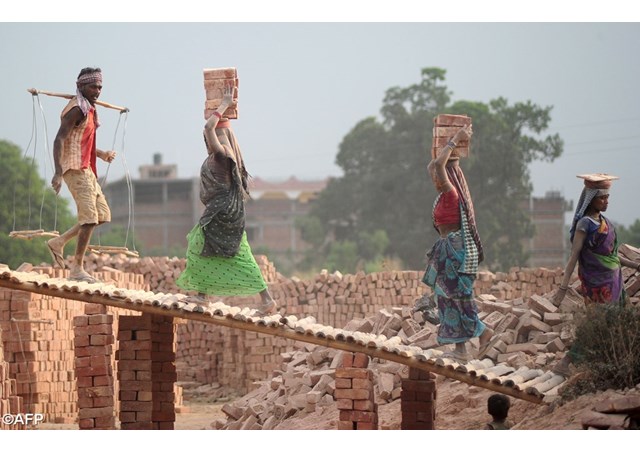
Indian bishops focus on migrants as trafficked victims on May Day

India’s Catholic bishops have issued a message for May 1 Labour Day, drawing attention especially to migrants who end up as victims of human trafficking. Migration and human trafficking “are interlinked since unorganized workers and un-informed people leave their home for work or are brought to work,” said Bishop Oswald Lewis of Jaipur, chairman of the Labour Office of the Catholic Bishops’ Conference of India (CBCI). "May Day,” he noted, “reminds us of the events and endeavours that have contributed to worker solidarity, the dignity of work and prosperity, unity and harmony among workers achieved through sweat and toil."
The bishop explained that in 1955 Pope Pius XII instituted the feast day of Saint Joseph Worker "to Christianize the concept of labour and give all workers a model and protector". For this reason, he hopes that today's celebration "can highlight the dignity of labour and bring a spiritual dimension to labour and labour unions."
Bishop Lewis particularly urged that migrant labourers not be forgotten saying they “are inherently vulnerable from the very moment they leave their homes in search of new places to feed themselves and their families.” “These brothers and sisters of ours are trying to escape difficult situations and find some serenity, peace and a better place for themselves and their families. Instead, they [often] go missing, are trafficked and end up desolate," the bishop noted.
Citing Pope Francis, who has repeatedly slammed human traffickers, Bishop Lewis stressed that "we cannot remain silent about the scandal of poverty [which causes] migratory movements. Violence, exploitation, discrimination, marginalisation, and restrictive approaches to the fundamental freedoms of individuals and groups are some of the chief elements of poverty that we must overcome. "
Joseph Jude, the president of the Workers India Federation (WIF) observed that "the victims of migration and human trafficking live in our midst, surround us every day. How can we identify them?" he wondered. "In the case of children or women employed as domestic workers, we must watch for signs of oppression, violence and discrimination that can be expressed in various ways, for example when children act withdrawn and show anxiety or signs of physical ill-treatment, unusual behaviour and verbal aggressiveness.”
It is no coincidence that the message of the Bishops' Conference Office focuses on the issue of migrant workers. In India, migration is widespread, both internal (90 per cent), from the poorest to the richest areas, and abroad, by those seeking fortune in the Middle East, Europe and North America. India itself is the destination of people trafficked from Nepal and Bangladesh, or a transit country for those who are on the way to the Middle East. According to the 2011 census, India has about 326 million internal migrants out of a population of 1.2 billion (28.5 per cent), employed mostly in construction, domestic work, garment industry, brick kilns, transport, mines, quarries and farming. Many end up in the sex trade or organ racket.
Migrants are denied basic services such as access to subsidized food, housing, drinking water, sanitation, health care, education and banking services. Most cannot afford legal protection and live in extreme poverty.
Bishop Jose Porunnedom of Mananthavady, a member of CBCI’s Labour Office, acknowledged that "poverty is the primary cause of human trafficking in our country." In order to stop this, the Labour Office and the WIF have set up a web portal, where migrants at home and abroad can register to get help. "Let this May Day bring good tidings of freedom, prosperity and peace to all the workers of our country,” Bishop Lewis urged. (Source: AsiaNews)
| All the contents on this site are copyrighted ©. |


